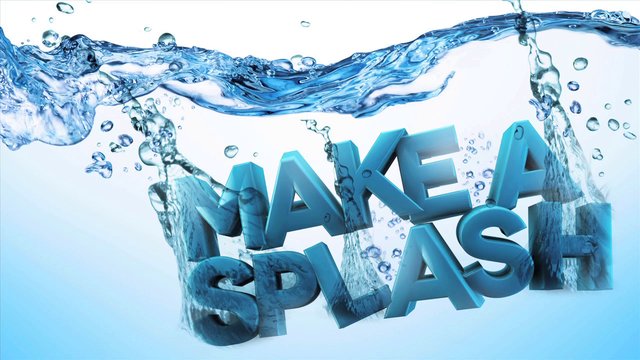Now, the VOA Learning English program Words and Their Stories.
This is the show that explains the origin and usage of common American English expressions.
Today, we are going to make a splash!
Yes, you make a splash when you jump into water. But to make a splash also means to attract a lot of attention, in a good way.
For example you could say, "She made in splash in Washington, D.C. as a political consultant." Or "If he moves to Hollywood he will make a huge splash in the film industry."
But let's get back to actually splashing in water. When it's hot, people often go to the beach or swimming pools to cool off in the water. The water is also a great place to learn American expressions.

Deep water can be scary if you do not know how to swim. Some people learn fast by jumping in. To sink or swim means the moment you test your ability, often before much practice. If you swim, you succeed. If you sink, you fail.
If you sink and no one rescues you, you will probably be dead in the water. When something is dead in the water, it has stopped making progress. It has failed and has no hope for the future. A business, an idea, even a marriage or friendship can be dead in the water.
For example, imagine you are involved in a business deal but your only financial supporter withdraws. Most likely, the deal is dead in the water.
Let's hear these expressions used in a short dialogue:
"Don't you think we should help Mary? Her deadline is tomorrow and she is far from finished with the project."
"Look, she's been with the company for years. Anyway, I helped her on the last project. It is sink or swim for her this time."
"Well, if she isn't ready for the presentation tomorrow morning her project will be dead in the water."
Swimming in the ocean can be a lot of fun. Surfers love to ride the waves. But did you know, you can ride a wave without even getting wet?
In English, to ride a wave means that you are helped by being connected to something well liked. For example, you could say, "The president is riding the wave of recent economic growth."
When you are surfing, catching a wave means to ride your surfboard across the wave in the ocean. But to catch a wave can also mean to connect with and profit from something popular.
For example, "The media company plans to catch the wave of new YouTube stars."
The word surf itself is used in other situations besides in the ocean. If you are surfing the Web, you are moving from webpage to webpage without much thought. Channel surfing is the same except with television channels.
So surfers love catching big waves. When the ocean is calm, I'm sure they wish they could make waves. However, you do not always have to be in the water to make waves.
This expression means to surprise, shock or trouble people or situations. It can be both good and bad. And you can add modifiers to the word "wave." For example, "When the new boss started, she didn't make to make too many waves. She's changing things slowly."
But we all know what really makes the waves in the ocean – the tide. The tide is the rising and falling of the sea. In spoken English, the tide can also turn. When the tides turn, events have changed direction, or reversed. We also say to turn the tide.
Ocean tides are strong. Swimming against the tide is not advisable. It can make you tired and you could drown. As an expression, it means to go against popular thought or opinion. Great leaders and scientists often swim against the tide.
To be in over your head and to be out of your depth are both water expressions. And they both mean to be in a situation that is too difficult for you to deal with. For example, "At the meeting, Rachel had no idea what they were talking about. She was way out of her depth."
And finally, to blow something out of the water means to destroy something completely.
To show how versatile these ocean expressions really are, let's use them in a very dry environment – a courtroom.
"The court will be break for 20 minutes."
"Wow, the defense attorney really made waves today in the courtroom when she presented that new evidence."
"Yeah, I did not see that coming. I think the tide is really turning in favor of the defendant."
"Well, the new evidence helps. But what really blew the case out of the water is the defense's new witness."
"You know, I feel bad for the prosecutor. He is new and just out of his depth."
"He is. He's lost his last nine cases! If he loses this one, he will lose his job. It's either sink or swim."
"If he gets fired, his career could be dead in the water."
And that brings us to the end of this collection of expressions from the sea. If you use a couple in your next English conversation, you are sure to make a splash!
Join us again next week for another Words and Their Stories.
I'm Anna Matteo.











